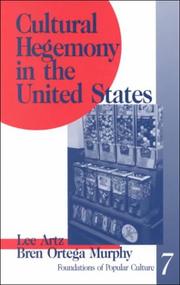| Listing 1 - 10 of 21 | << page >> |
Sort by
|

ISBN: 0803945027 132241324X 1452221960 9781452221960 9780803945029 9781322413242 Year: 2000 Publisher: Thousand Oaks, Calif. : Sage Publications,
Abstract | Keywords | Export | Availability | Bookmark
 Loading...
Loading...Choose an application
- Reference Manager
- EndNote
- RefWorks (Direct export to RefWorks)
This text is the first to present cultural hegemony in its original form - as a process of consent, resistance, and coercion. Hegemony is illustrated with examples from American history and contemporary culture, including practices that represent race, gender and class in everyday life.
Popular culture --- Dominance (Psychology) --- Social hierarchy (Psychology) --- Control (Psychology) --- Social groups --- United States --- Social conditions --- Civilization.

ISBN: 0742536920 0742536939 1299782043 0742568601 9780742568600 9780742536937 9780742536920 9780742536920 Year: 2005 Publisher: Lanham, Maryland ; Oxford, England : Rowman & Littlefield Publishers, Inc.,
Abstract | Keywords | Export | Availability | Bookmark
 Loading...
Loading...Choose an application
- Reference Manager
- EndNote
- RefWorks (Direct export to RefWorks)
This short, engaging volume develops new and sociologically sophisticated concepts to bring the fields of biology and sociology together. It is about the social biology of face-to-face dominance interactions and explores the evolution of behavior through connections among biology, language, culture, and socialization. Meant to be a self-contained exploration_sociologists would require no prior knowledge of biology; biologists would require no prior knowledge of sociology_this book is a fun, informative supplement for courses throughout sociology and the social sciences.
Dominance (Psychology) --- Psychology, Comparative. --- Social hierarchy in animals. --- Dominance (Psychology). --- Social hierarchy in animals --- Psychology, Comparative --- Social Sciences --- Psychology --- Behavior, Comparative --- Comparative behavior --- Comparative psychology --- Ethology, Comparative --- Intelligence of animals --- Dominance organization in animals --- Hook order --- Peck order --- Peck right hierarchy --- Pecking order --- Rank order (Social hierarchy in animals) --- Social hierarchy (Psychology) --- Zoology --- Animal behavior --- Animal intelligence --- Animal psychology --- Human behavior --- Instinct --- Social behavior in animals --- Control (Psychology) --- Social groups
Book
ISBN: 1503637034 Year: 2023 Publisher: Redwood City : Stanford University Press,
Abstract | Keywords | Export | Availability | Bookmark
 Loading...
Loading...Choose an application
- Reference Manager
- EndNote
- RefWorks (Direct export to RefWorks)
"Helmut Puff invites readers to visit societies and spaces of the past through the lens of a particular temporal modality: waiting. From literature, memoirs, manuals, chronicles, visuals, and other documents, Puff presents a history of waiting anchored in antechambers - interior rooms designated and designed for people to linger. In early modern continental Western Europe, antechambers became standard in the residences of the elites. As a time-space infrastructure these rooms shaped encounters between unequals. By imposing spatial distance and temporal delays, antechambers constituted authority, rank, and power. Puff explores both the logic and the experience of waiting in such formative spaces, showing that time divides as much as it unites, and that far from what people have said about early moderns, they approached living in time with apprehensiveness. Unlike how contemporary society primarily views the temporal dimension, to early modern Europeans time was not an objective force external to the self but something that was tied to acting in time. Divided only by walls and doors, waiters sought out occasions to improve their lot. At other times, they disrupted the scripts accorded them. Situated at the intersection of history, literature, and the history of art and architecture, this wide-ranging study demonstrates that waiting has a history that has much to tell us about social and power relations in the past and present"--
European literature --- Waiting (Philosophy) in literature. --- Entrance halls in literature. --- Time in literature. --- Space in literature. --- Themes, motives. --- history of time. --- premodern Europe. --- social hierarchy. --- temporality. --- waiting.

ISBN: 0415268362 1134493681 1280157186 0203166523 9780203166529 0203261259 9780203261255 9780415436687 0415436680 9780415268363 9781134493630 9781134493678 9781134493685 1134493673 987118302X Year: 2002 Publisher: London : Routledge,
Abstract | Keywords | Export | Availability | Bookmark
 Loading...
Loading...Choose an application
- Reference Manager
- EndNote
- RefWorks (Direct export to RefWorks)
Idea (Philosophy) --- Critical realism. --- Dominance (Psychology) --- Social hierarchy (Psychology) --- Control (Psychology) --- Social groups --- Philosophy, Modern --- Realism --- Ideas, Theory of --- Ideas (Philosophy) --- Theory of ideas --- Knowledge, Theory of --- Philosophy --- Memetics --- Philosophy.

ISBN: 9027251088 1588110575 9786612162442 1282162446 9027298106 9789027298102 9781588110572 9781282162440 Year: 2001 Publisher: Amsterdam ; Philadelphia : J. Benjamins Pub. Co.,
Abstract | Keywords | Export | Availability | Bookmark
 Loading...
Loading...Choose an application
- Reference Manager
- EndNote
- RefWorks (Direct export to RefWorks)
This book investigates the notion of conversational dominance in depth, and seeks to establish a systematic method of analysing it. It also offers a new insight into the role of gender and the pragmatic transfer of conversational norms in the first and second language conversations among native speakers of Japanese.Drawing upon a critical synthesis of insights from several different fields, including Conversation Analysis, the Birmingham school of discourse analysis, and dialogical analysis, the author proposes an innovative analytical framework for operationalising the concept of dominance in conversation. She then applies this framework to the empirical analysis of Japanese speakers' L1 and L2 conversations, finding direct evidence for the important role of gender and pragmatic transfer in conversational dominance.By integrating quantitative and qualitative approaches to discourse analysis, the author offers a new perspective into the pragmatic transfer of conversational norms. She does so by demonstrating how the notion of self-oriented and other-oriented conversational styles and strategies can affect the level of transfer of interactional behaviour differently for male and female speakers.
Japanese language --- -Japanese language --- -Dominance (Psychology) --- Social hierarchy (Psychology) --- Control (Psychology) --- Social groups --- Koguryo language --- Discourse analysis --- Sex differences --- Psycholinguistics --- Sociolinguistics --- Pragmatics --- Dominance (Psychology). --- LANGUAGE ARTS & DISCIPLINES --- Linguistics / General --- East Asian Languages & Literatures --- Languages & Literatures --- Discourse analysis. --- Sex differences. --- Dominance (Psychology)
Periodical
ISSN: 23808969 Year: 2014 Publisher: Minneapolis, MN : University of Minnesota Libraries Publishing,
Abstract | Keywords | Export | Availability | Bookmark
 Loading...
Loading...Choose an application
- Reference Manager
- EndNote
- RefWorks (Direct export to RefWorks)
"Dedicated to sharing new knowledge and successful applications of Riane Eisler's partnership paradigm: a new perspective on human possibilities increasingly utilized, explored, and expanded by others."
Interpersonal relations and culture --- Power (Social sciences) --- Dominance (Psychology) --- Interpersonal relations and culture. --- Empowerment (Social sciences) --- Political power --- Culture and interpersonal relations --- Social hierarchy (Psychology) --- partnership --- cultural transformation --- domination --- collaboration --- Exchange theory (Sociology) --- Political science --- Social sciences --- Sociology --- Consensus (Social sciences) --- Culture --- Control (Psychology) --- Social groups --- Social Conditions

ISBN: 1281125865 9786611125868 0226502406 9780226502403 9780226502410 0226502414 9780226502427 0226502422 9781281125866 6611125868 Year: 2004 Publisher: Chicago : University of Chicago Press,
Abstract | Keywords | Export | Availability | Bookmark
 Loading...
Loading...Choose an application
- Reference Manager
- EndNote
- RefWorks (Direct export to RefWorks)
Born Françoise d'Aubigné, a criminal's daughter reduced to street begging as a child, Madame de Maintenon (1653-1719) made an improbable rise from impoverished beginnings to the summit of power as the second, secret wife of Louis XIV. An educational reformer, Maintenon founded and directed the celebrated academy for aristocratic women at Saint-Cyr. This volume presents the dialogues and addresses in which Maintenon explains her controversial philosophy of education for women. Denounced by her contemporaries as a political schemer and religious fanatic, Maintenon has long been criticized as an opponent of gender equality. The writings in this volume faithfully reflect Maintenon's respect for social hierarchy and her stoic call for women to accept the duties of their state in life. But the writings also echo Maintenon's more feminist concerns: the need to redefine the virtues in the light of women's experience, the importance of naming the constraints on women's freedom, and the urgent need to remedy the scandalous neglect of the education of women. In her writings as well as in her own model school at Saint-Cyr, Maintenon embodies the demand for educational reform as the key to the empowerment of women at the dawn of modernity.
Women --- Human females --- Wimmin --- Woman --- Womon --- Womyn --- Females --- Human beings --- Femininity --- Education --- Conduct of life --- madame de maintenon, feminist theory, feminism, education, gender, women, rags to riches, power, monarchy, secret wife, louis xiv, equality, saint-cyr, aristocracy, academy, wealth, social hierarchy, class, duty, obligation, roles, virtue, experience, freedom, liberty, constraint, literacy, empowerment, piety, privilege, marriage, reputation, religion.

ISBN: 020305721X 1283838907 1136571523 9781136571527 9780203057216 9781136571596 9781136571664 9781560233749 9781560233756 Year: 2003 Publisher: New York : Harrington Park Press,
Abstract | Keywords | Export | Availability | Bookmark
 Loading...
Loading...Choose an application
- Reference Manager
- EndNote
- RefWorks (Direct export to RefWorks)
Gay men reveal their preference?and the reasons behind it! Gay Men and Anal Eroticism: Tops, Bottoms, and Versatiles is a no-holds-barred examination of one of society's most persistent taboos. In a remarkably candid collection of frank and forthright interviews, 21 gay men talk about the role anal sex plays in their lives and relationships and their choices to act as insertive (?top?) or receptive (?bottom?) partners?or both (?versatile?). Ranging in age from 21 to 65, the men discuss the reasons behind (and consequences of) their choices; how they define their sexual roles (and how t
Gay men --- Anal sex. --- Anus (Psychology) --- Dominance (Psychology) --- Gays, Male --- Homosexuals, Male --- Male gays --- Male homosexuals --- Urnings --- Gays --- Men --- Identity (Psychology) --- Social hierarchy (Psychology) --- Control (Psychology) --- Social groups --- Anal character --- Anal eroticism --- Anal reflex --- Anality --- Psychoanalysis --- Sex (Psychology) --- Anal intercourse --- Sex, Anal --- Sexual intercourse --- Sexual behavior. --- Identity.
Book
ISBN: 1789200946 1789200938 1789208114 Year: 2019 Publisher: New York ; Oxford : Berghahn Books,
Abstract | Keywords | Export | Availability | Bookmark
 Loading...
Loading...Choose an application
- Reference Manager
- EndNote
- RefWorks (Direct export to RefWorks)
Of the three categories that Raul Hilberg developed in his analysis of the Holocaust—perpetrators, victims, and bystanders—it is the last that is the broadest and most difficult to pinpoint. Described by Hilberg as those who were “once a part of this history,” bystanders present unique challenges for those seeking to understand the decisions, attitudes, and self-understanding of historical actors who were neither obviously the instigators nor the targets of Nazi crimes. Combining historiographical, conceptual, and empirical perspectives on the bystander, the case studies in this book provide powerful insights into the complex social processes that accompany state-sponsored genocidal violence.
Holocaust, Jewish (1939-1945) --- Bystander effect --- Accomplices --- Moral and ethical aspects. --- History --- Raul Hilberg. --- antisemitism. --- auschwitz. --- concentration camps. --- empirical perspective. --- engaging. --- genocidal violence. --- genocide. --- german history. --- government and governing. --- historical figures. --- historiographical. --- holocaust. --- nazi fascist party. --- nazi war crimes. --- nazism. --- political history. --- revolutionaries. --- social hierarchy. --- social processes. --- wwii germany. --- wwii history.
Book
ISBN: 0520316088 0520974131 9780520974135 9780520316089 Year: 2019 Publisher: Oakland University of California Press
Abstract | Keywords | Export | Availability | Bookmark
 Loading...
Loading...Choose an application
- Reference Manager
- EndNote
- RefWorks (Direct export to RefWorks)
A free open access ebook is available upon publication. Learn more at www.luminosoa.org.What Is a Family? explores the histories of diverse households during the Tokugawa period in Japan (1603-1868). The households studied here differ in locale and in status-from samurai to outcaste, peasant to merchant-but what unites them is life within the social order of the Tokugawa shogunate. The circumstances and choices that made one household unlike another were framed, then as now, by prevailing laws, norms, and controls on resources. These factors led the majority to form stem families, which are a focus of this volume. The essays in this book draw on rich sources-population registers, legal documents, personal archives, and popular literature-to combine accounts of collective practices (such as the adoption of heirs) with intimate portraits of individual actors (such as a murderous wife). They highlight the variety and adaptability of households that, while shaped by a shared social order, do not conform to any stereotypical version of a Japanese family.
History --- Asian history --- Families --- Japan --- Social life and customs --- Family --- Family life --- Family relationships --- Family structure --- Relationships, Family --- Structure, Family --- Social institutions --- Birth order --- Domestic relations --- Home --- Households --- Kinship --- Marriage --- Matriarchy --- Parenthood --- Patriarchy --- Social aspects --- Social conditions --- adoption. --- archives. --- class. --- early modern japan. --- family order. --- family structure. --- family. --- gender. --- heirs. --- history. --- household. --- infidelity. --- japan. --- japanese history. --- kimono. --- legal system. --- literature. --- merchant. --- murder. --- nonfiction. --- outcast. --- parenting. --- peasant. --- privilege. --- relationships. --- samurai. --- social hierarchy. --- social history. --- social order. --- tokugawa. --- trial. --- true crime.
| Listing 1 - 10 of 21 | << page >> |
Sort by
|

 Search
Search Feedback
Feedback About UniCat
About UniCat  Help
Help News
News